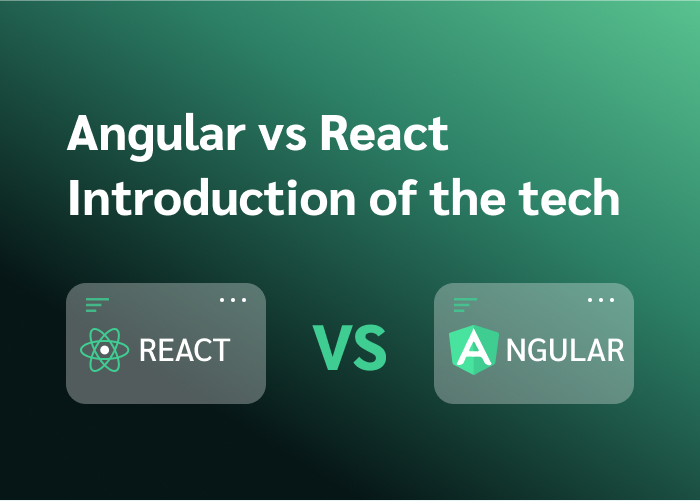Angular vs React – Introduction of the tech

Firslty, let’s have an introduction in this Angular vs React battle.
- A complete framework for creating desktop, mobile, and online apps is called Angular. A group of developers and Google work together to build and maintain it. Angular is based on the Model-View-Controller (MVC) design, which maintains a clear separation of the data model, user interface, and application functionality. Angular is suitable for building large-scale applications with complex requirements. It’s widely used in enterprise-level applications, single-page applications (SPAs), and progressive web apps (PWAs).
- Facebook created the JavaScript library React for creating user interfaces. In contrast to Angular, React does not offer a full-featured framework; instead, it concentrates only on the application’s view layer. It has a component-based architecture, meaning that reusable components make up the user interface. React is suitable for building interactive user interfaces, single-page applications, and mobile applications. It’s widely adopted in the industry due to its simplicity, flexibility, and performance.
Angular vs React – Detailed comparison
Major distinctions in Angular vs React rely on a number of factors. Let’s talk about each one separately.
Angular vs React – Code maintainability
A more opinionated and organized framework is offered by Angular, which can aid in preserving consistency between projects. Certain standards and best practices, such the use of modules, components, services, and directives, are enforced by the framework and can help to improve the readability and maintainability of code.
On the other hand, the component-based design of React encourages code modularity and reuse. By dividing code into smaller, more manageable chunks, components—self-contained units of code with well specified inputs and outputs—make code easier to comprehend and maintain.
Angular vs React – Server-side rendering
Angular allows developers to render Angular applications on the server side before sending the HTML to the client. The degree to which you can optimize server-side speed by combining JSON with client-side caching is up to you. When it comes to cutting down on client-server bandwidth, nothing compares to Angular.
Similarly, React handles server-side rendering effortlessly with the aid of a few key features. Alternatively, you may call the RenderToString method rather than Render. React is a very flexible package that is less rigid than other JavaScript frameworks.
Angular vs React – Component Architecture
The architecture of both React and Angular is component-based. They have coherent, modular, and reusable components as a consequence. On the other hand, the technical stack distinguishes Angular from React.
While TypeScript is used by Angular for efficient and error-free web application development, JavaScript is used by React architecture.
Angular vs React – Performance
As you can see, Angular and React have different characteristics. Furthermore, React depends more on a state management library. To enhance state management, API interaction, and routing, frameworks like as Helmet, Redux, and React Router may be utilized.
Conversely, Angular comes with a number of features including data binding, project construction, and component-based routing and doesn’t require any other libraries. On the other hand, state management frameworks can help it expand its functionality.
Angular vs React – Making right choice
Select Angular when you have to create an enterprise-level application with plenty of functionality or app complexity is low. On the other hand, select React when the developers are proficient in JavaScript, HTML, and CSS and the app has to have shareable components.
Conclusion
Building large-scale applications with complicated needs is a good fit for Angular while React’s virtual DOM, lightweight design, and adaptable architecture make it perfect for creating single-page apps and interactive user interfaces.
The decision between Angular and React ultimately comes down to things like development preferences, team experience, and project needs. While React offers flexibility, speed, and a thriving ecosystem of tools and frameworks for designing modern user interfaces, Angular offers a structured and controlled framework for building substantial apps.
FAQs
Is Angular better than React?
Why choose Angular over React?
Will Angular overtake React?
Why Angular is so tough?
Why did Angular lose popularity?
Ravi Bhojani is the Chief Marketing Officer (CMO) at Alian Software, where he spearheads the company’s marketing strategies and drives its brand presence in the competitive IT services landscape. With over a decade of experience in the technology and marketing sectors, Ravi has consistently demonstrated his ability to blend innovative marketing techniques with deep industry knowledge to deliver outstanding results.